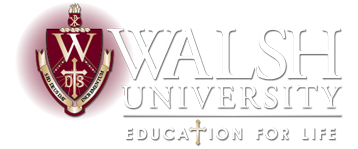Walsh University is committed to fostering an institutional climate in which qualified students with disabilities have full access to the academic environment. The Office of Accessibility Services (OAS) allows students the opportunity for full participation in the Walsh Experience by providing reasonable, appropriate accommodations, as directed by Section 504 of the Rehabilitation Act of 1973, the Americans with Disabilities Act of 1990, and the Americans with Disabilities Act Amendments Act of 2008.
In accord with these federal regulations, listed below are the student occupational therapist's physical and mental requirements, along with descriptions to assist each candidate to evaluate his/her prospects for academic and fieldwork success. When a student's ability to perform is compromised, the student must demonstrate alternative means and/or abilities to perform the described requirement. Each student must read each requirement carefully. Once admitted into the program, the student will sign a form indicating that s/he has read and understood these requirements. If a student is not sure of the ability to meet these requirements due to disability-related reasons or a temporary medical issue, or know of anything that currently or in the future might affect the ability to fulfill these requirements, please contact Meredith Soduk, Director of Academic Support Services at msoduk@walsh.edu or (330)490-7529 to discuss individual situations.
Accessibility Services for Students with Disabilities
Walsh University is committed to fostering an institutional climate in which qualified students with disabilities have full access to the academic environment. It is our practice to create an inclusive and accessible learning environment consistent with federal law.
If you feel that you may need an accommodation based on the impact of a disability or temporary medical condition, please contact Meredith Soduk, the Director of Academic Support Services, at 330-490-7529 or msoduk@walsh.edu. Accessibility Services will confidentially discuss your needs, review your documentation, and determine your eligibility for reasonable accommodations. Please know that it is the student’s responsibility to request and coordinate accommodations. Although students may contact Accessibility Services at any point throughout the semester, it is ideal for a student’s accommodations to be arranged and communicated as early as possible because accommodations are not retroactive.
Students must maintain current eligibility for accommodations in accordance with Academic Support Services. A student will be ineligible to receive accommodations without providing documentation on his/her disability and consenting to the limited sharing of information.
NOTE: Requesting accommodations to meet the below listed physical and mental requirements does not affect the student’s status in the program.
In addition to the Physical and Mental Requirements listed below, it is expected that the student occupational therapist adhere to the Occupational Therapy Code of Ethics (2015) (American
Occupational Therapy Association, 2015) and the Walsh University OT Professional Behavior policies.
| Skills | Associated Requirements |
| Social-Behavioral |
|
| Physical Mobility |
|
| Critical Thinking |
|
| Sensory |
|
| Interpersonal Communication |
|
Note: Specific fieldwork sites may have additional and unique requirements beyond those listed above. Accommodations given during fieldwork rotations are determined by the fieldwork site and it is the responsibility of the student to request such accommodations. However, fieldwork sites are not required by law to provide accommodations for students. Please keep in mind that qualifying for a disability-related fieldwork accommodation does not guarantee you the fieldwork assignment of your choice. An assignment that meets your accommodation needs may not be available. If that is the case, you may decide to forgo the approved fieldwork accommodation or you may wait until an assignment that meets your accommodation needs comes available (which could delay graduation).
Adapted from the Essential Functions documents from the following: Xavier University, The Ohio State University, Seton Hall University, Cleveland State University.
References:
American Occupational Therapy Association. (2014). Guidelines for supervision, roles, and responsibilities during the delivery of occupational therapy services. American Journal of Occupational Therapy, 68(Suppl. 3), S16-S22.
American Occupational Therapy Association. (2015). Occupational therapy code of ethics (2015).
American Journal of Occupational Therapy, 69(Suppl. 3), S17-S26.
American Occupational Therapy Association. (2015). Standards of practice for occupational therapy.
American Journal of Occupational Therapy, 69(Suppl. 3), 6913410057p1-6913410057p6.
